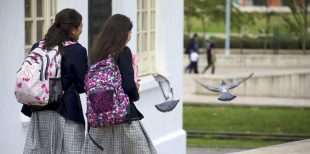
Schools and colleges will open to more pupils as soon as possible as this is best for pupils’ education and wellbeing. But the decision to reopen schools to more than just vulnerable pupils and children of critical workers is dependent on pressures on the NHS.
The decision to restrict attendance in schools and colleges was taken because of the wider public health picture - not because they are unsafe. This took into consideration community infection rates, the safety of members of the public most at risk, and particularly, the need to protect the NHS from being overwhelmed.
When will you open schools and colleges? You said they would be the first things to open when lockdown lifts.
That’s right – opening schools and colleges to more pupils is the priority, as soon as some restrictions can ease. Since the early stages of the pandemic we have prioritised opening schools, colleges and early years settings to as many young people as possible. That’s why schools and colleges opened their doors to more pupils in June of last year, ahead of pubs and many other settings in July.
As the Prime Minister said earlier this month when the new restrictions were announced:
We have been doing everything in our power to keep [schools] open, because children’s education is too vital and their futures too precious to be disrupted until every other avenue, every other option, has been closed off and every other course of action has been taken.
That is why schools were the very last thing to close, as I have long promised they would be. When we begin to move out of lockdown, I promise that they will be the very first things to reopen. That moment may come after the February half-term, although we should remain extremely cautious about the timetable ahead.
We will reopen schools and colleges to more pupils as soon as the public health picture allows, in terms of the spread of the virus in communities and the pressures on the NHS. In doing so, the Department for Education will be guided by the scientific and medical experts, where the latest data and evidence is considered regularly, including by SAGE, the Joint Biosecurity Centre, Public Health England, and the Government’s chief medical officers and scientific advisers.
Yesterday the Prime Minister said:
Believe me, there is nothing I want to do more than reopen schools. I’ve fought to keep schools open for as long as I possible could.
We want to see schools back as fast as possible and we want to do that in a way that is consistent with fighting the epidemic and keeping the infection rate down.
School Standards Minister Nick Gibb also spoke about how schools will open to more pupils in the House of Commons today.
Throughout the pandemic we've been clear: education is a national priority.
But the decision on reopening schools, colleges and unis has to be based on clear public health data and guided by scientific evidence. pic.twitter.com/w6oB0GASd1
— Department for Education (@educationgovuk) January 26, 2021
Is this a change in your position – we thought schools and colleges would go back after February half term?
We have always been clear that pupils would go back to schools and colleges as soon as possible, but only when we know it wouldn’t pose a risk to wider public health.
The Government continues to review the daily incoming data from the NHS and PHE. This helps to inform us of the latest public health picture.
As we approach February half-term, we will ensure that schools are kept informed of decisions around schools reopening.
So at what point will you say when schools will reopen?
We know just how important it is to help pupils, parents and schools and colleges prepare for reopening by providing sufficient notice.
We will give staff, pupils and parents two weeks’ notice once we can be confident that opening schools to more pupils will not put pressure on the NHS.
Until then, we ask schools and staff to continue provide high-quality remote education, enabling children to access the help that they need to continue learning whilst at home alongside on-site provision for vulnerable children and the children of critical workers.
If schools reopen will other things have to close?
The easing or increasing of wider lockdown restrictions are based on a number of factors. These decisions are not being made in isolation and schools will be reopened as soon as we know that this will not jeopardise national collective efforts to control the spread of the virus, save lives, and protect the NHS.
So more home schooling?
Vulnerable children and the children of critical workers remain in school. This is so that vulnerable children can get the support they need, and so that parents who are critical workers can continue working in services vital to our coronavirus response.
We have also worked hard to ensure that children are able to access remote learning through at-home devices such as tablets and laptops.
As of Monday 25 January, we have delivered over 870,000 laptops and tablets to schools, trusts and local authorities, including over 300,000 since the start of January. We are grateful to EE, O2, Sky Mobile, Smarty, Tesco Mobile, Three, Virgin Mobile, Vodafone, BT Mobile and Lycamobile. We are currently engaged with additional mobile network operators and continue to invite a range of mobile network providers to support the offer.
This has been backed by a £400 million investment in access to remote education and online social care. This comes alongside our commitment to helping young people catch up after a period of disruption to their education through the National Tutoring Programme, which 70,000 pupils have already enrolled in, and the universal Catch-Up Premium.
We also continue to work with Oak Academy who are helping to support home learning across the UK.